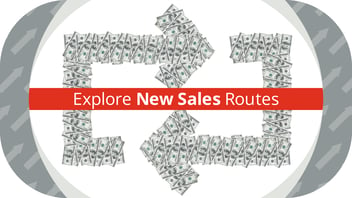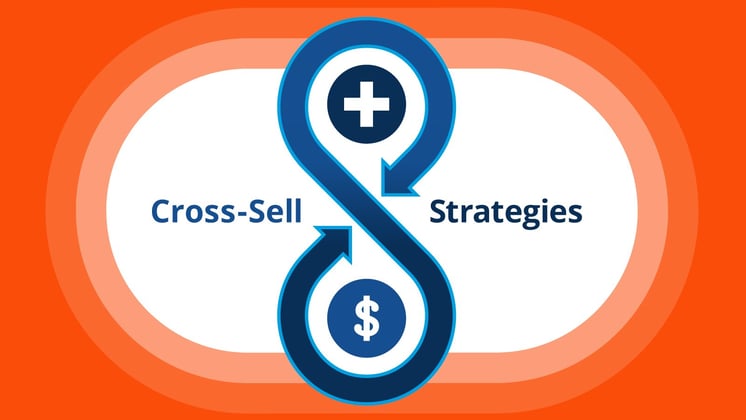
As you grow your book of business and start generating more renewal income, it’s natural to shift from a “survival mode” mentality to more of a “next-level growth” line of thinking. When you begin to think more like a business owner, you start considering which “levers” you can pull to drive growth. For example, if you want to grow top-line revenue, one lever might be buying more leads to boost client acquisition. Another important lever available to help you grow your revenue is cross-selling.
If you’re interested in maximizing your revenue and increasing client satisfaction through cross-selling, here are eight proven best practices to help you pivot from Medicare to other solutions.
- Use a fact finder – A formal fact finder process may seem like overkill for a Medicare
 sale. However, asking some additional questions will help you uncover areas of need your clients may have, which will lead to opportunities later. For example, many agents don’t think it’s important to ask a Medicare client about finances. But income is very relevant to determining Part B premium, or qualification for extra help. If you’re worried about coming off as invasive with your questions, just remember that cross-selling isn’t only about increasing your sales. It’s also about making sure your clients have the coverage they need. Senior Market Sales® (SMS) has multiple fact-finder templates available in our Client Stream® Marketing Library.
sale. However, asking some additional questions will help you uncover areas of need your clients may have, which will lead to opportunities later. For example, many agents don’t think it’s important to ask a Medicare client about finances. But income is very relevant to determining Part B premium, or qualification for extra help. If you’re worried about coming off as invasive with your questions, just remember that cross-selling isn’t only about increasing your sales. It’s also about making sure your clients have the coverage they need. Senior Market Sales® (SMS) has multiple fact-finder templates available in our Client Stream® Marketing Library. - Point out coverage gaps – When you use a fact finder, gaps in your client’s coverage will
 become apparent. You don’t need to derail the sale you’re trying to make, just remember to circle back to these when the time is right. If you’re worried about coming off as a “pushy salesperson” just looking for an up-sell, you can explain to clients that “I feel I would be doing a disservice if I didn’t point out you have a potential gap in your coverage.”
become apparent. You don’t need to derail the sale you’re trying to make, just remember to circle back to these when the time is right. If you’re worried about coming off as a “pushy salesperson” just looking for an up-sell, you can explain to clients that “I feel I would be doing a disservice if I didn’t point out you have a potential gap in your coverage.”
- Bundle ancillary plans – Certain ancillary plans match well with Medicare plans. For example,
 standalone dental plans pair well with Medicare Supplements since Medicare Supplements don’t include dental coverage. Likewise, hospital indemnity works well to fill in potential coverage gaps inherent in Medicare Advantage policies. As you’re going through the enrollment, ask questions like “Would you like information about dental insurance?”
standalone dental plans pair well with Medicare Supplements since Medicare Supplements don’t include dental coverage. Likewise, hospital indemnity works well to fill in potential coverage gaps inherent in Medicare Advantage policies. As you’re going through the enrollment, ask questions like “Would you like information about dental insurance?” - Build other solutions into your sales process – Having a process that allows you to explain all
 the needs that you help clients with is critical. Capture your process and available solutions on a one-pager that you can provide to a client during the appointment or send in an email after the meeting, saying “We’ve addressed your Medicare needs today, but I want to make you aware of all the services we provide.”
the needs that you help clients with is critical. Capture your process and available solutions on a one-pager that you can provide to a client during the appointment or send in an email after the meeting, saying “We’ve addressed your Medicare needs today, but I want to make you aware of all the services we provide.” - Document all your recommendations – Documenting your recommendations means putting
 them in writing for the client and yourself. If you discuss gaps in the client’s coverage and recommend solutions, put it in writing and send a recap email after the meeting. Also, document the discussion and the recommendations in your CRM. This will allow you to resurface these issues in future discussions.
them in writing for the client and yourself. If you discuss gaps in the client’s coverage and recommend solutions, put it in writing and send a recap email after the meeting. Also, document the discussion and the recommendations in your CRM. This will allow you to resurface these issues in future discussions. - New client onboarding process – Every agent should have a new client onboarding process.
 What that looks like will vary from agent to agent, but it could be as simple as an automated email program that communicates a welcome/thanks message and then follows with a series of brief “Did You Know we also do…” emails. If you have a CRM, you can set up a workflow that triggers the emails to send automatically when you move them from “lead” status to “client”. Or, you can check out the Client Stream Marketing Platform from SMS.
What that looks like will vary from agent to agent, but it could be as simple as an automated email program that communicates a welcome/thanks message and then follows with a series of brief “Did You Know we also do…” emails. If you have a CRM, you can set up a workflow that triggers the emails to send automatically when you move them from “lead” status to “client”. Or, you can check out the Client Stream Marketing Platform from SMS. - Annual review meetings – When you conduct your annual coverage review meetings with
 clients, that’s the time to resurface coverage gaps and solutions discussed in the past. “Last time we talked, we discussed the fact that you don’t have any dental coverage. Is that something you want to look into for this year?”
clients, that’s the time to resurface coverage gaps and solutions discussed in the past. “Last time we talked, we discussed the fact that you don’t have any dental coverage. Is that something you want to look into for this year?” - Cross-selling drip campaigns – Email is one of the most under-utilized
 tactics among agents who have established books of business. Most agents cite at least one and sometimes all of the following reasons for not emailing: they don’t know what to send to their clients, they don’t have the time to create content, or they feel like they’d be bothering people if they emailed them. On the latter point, surveys show that most clients are interested in receiving information from their agents as long as it’s relevant.* To the former points, there are platforms available that will not only provide the drip email content but also automate the email sends so you don’t have to think about it.
tactics among agents who have established books of business. Most agents cite at least one and sometimes all of the following reasons for not emailing: they don’t know what to send to their clients, they don’t have the time to create content, or they feel like they’d be bothering people if they emailed them. On the latter point, surveys show that most clients are interested in receiving information from their agents as long as it’s relevant.* To the former points, there are platforms available that will not only provide the drip email content but also automate the email sends so you don’t have to think about it.
It’s important to acknowledge that some agents just don’t want to branch out into other products or markets. They want to focus on what they’re good at while making their appointments as efficient as possible. Although there is nothing inherently wrong with that strategy, it doesn’t negate the fact that their clients have other needs. If you want to start helping your clients with additional needs while diversifying your income, SMS has many solutions to help you. Call a licensed SMS Med Solutions marketing consultant at 1.888.747.3810 to talk about how to get started on these cross-sell opportunities.
*According to a survey from Collinson, 63% of respondents stated that they are open to more communications from their insurers, and 73% indicated they’re interested in receiving targeted recommendations.
For Licensed Insurance Agent/Advisor Use Only. Not for General Public.


Meet With More Clients, Consistently Quote...
You know the saying: time is money. That statement is especially true in the Medicare insurance sales industry. Agents maximize sales by meeting with...

SMS Services You Might Not Know About...
Whether Medicare is your bread and butter or you sell none of it, Senior Market Sales® (SMS) has a Medicare solution so you never have to turn away...

